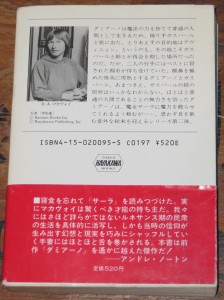All ‘About the Author’ pieces I have read have been written in third-person, but also have obviously been written by the writer themselves, merely turning the words ‘I’ to ‘he or ‘she’. So I decided to make the entire thing transparent – or at least semi-transparent – by being both the person who is supposedly asking questions and the person who is answering them.
So, I begin: – no – it must me that ‘we’ begin:
Tell me how you began to write using the name ‘R.A. MacAvoy’:
It started because of the books I could reach up and pull down from the shelves of the public library. They were made library-worthy by having been bound in a linen and cardboard frame with a spine so strong it would never need a chiropractor. They were covered all over with a wax, or resin, or epoxy so durable they could survive years of being leaped upon and dragged down by hands like mine. The words along the spine also had to be heavy, enduring and as minimal as possible, even though they always seemed to be gilt to the child I was.
And the writer whose name I saw, was most frequently R.A. Heinlein. It might have been simply a matter of how high I could jump, or someone who stocked the library being a great fan of his, but I could not but notice the coincidence of the first two initials. It seemed meaningful to me. People want coincidences to be meaningful, whether speaking of sun-sign astrology or the answers found to be correct on the school-tests that form our futures. Later I discovered R.A. Lafferty, and my idea was gelling – it was auspicious to have the initials ‘R’ and ‘A’. Years down the pike my life was changed by a story written by a man with the initials ‘R A’ Cain, and since the third time is always the charm, it was sealed. As a writer, I would be R.A. MacAvoy. I’ve never regretted it.
Not even when certain people thought you were inappropriately hiding your sex? As though ashamed to be female?
Well, that did happen. Writers like William Tenn, a few decades before, had written under a male pseudonym, thinking their work would not be taken seriously as Science Fiction writers if it were known they were women. I, also, was wary of being known as ‘Roberta’. Both because it was a female name and a name I never cared for. No one could be less a ‘Roberta’ than myself. I was named after a nineteen-thirties movie with Astaire-Rogers and Irene Dunn and Montgomery Scott. It wasn’t even a very good movie. I think my mother simply liked Irene Dunn singing the song Smoke Gets In Your Eyes. I might as well have been named Smokey.
Actually, I was hoping to publish under a name that would conceal as much about my physical self as I could. A complete barrier. Impossible to do, I know. That idea of mine was exploded on the cover of my first book, when Anne McCaffrey wrote a lovely blurb for me beginning ‘Roberta MacAvoy . . . ‘ The idea went up in smoke. Smoke, again.
But my publishing pseudonym was not only an attempt to cover-over my being female. The truth is, that as a writer (or reader) I’ve never identified much as a human being. Came from reading S.F. from my earliest days, I suppose. I might as well have been an alien. Or an animal other than primate. That was the freedom of Speculative Fiction.
The entire goal of being invisible was squelched the first time I had to attend a convention, wearing the Badge.
How did you feel about conventions? Selling your books in person, as it were? That whole thing?
I hated it. Conventions were fun until I became the person at the end of the table on a panel. The small, slight woman whose reasoned comments – or so I thought them – were bellowed down by male writers with leather elbow patches and pipes. Really. It’s hard to believe now, but pipes. I had spent four years in school in the debate club, and was familiar with Robert’s Rules of Order and all such. I was very good at public speaking. But the panels were simple dog-eat-dog affairs, with no rules at all. And the people designated as moderator had neither the power nor the skills to perform their function. This was in the mid-eighties, remember, and whether things changed before the entire nature of conventions changed I can’t tell you. I stopped attending. Or I stopped attending with The Writer’s Badge. Simply showing up at a convention could still be fun. I met interesting people. Even without The Badge I could usually weasel my way into the Green Room.
As for selling my books, I always hated it. I don’t think I could sell water to a man dying of thirst. A rich man dying of thirst. Yet here I am, after all these years, with a website and my own colophon aborning and doing all that. Because if one wants one’s voice to be heard, and to get that thrilling response from perfect strangers who seem to have understood things one hardly understood one’s self – well, one must publish. Writing for the drawer, or I guess now for the cloud, is bitter stuff.
And you are writing again . . . ?
Oh, that is a stupid question! I never stopped writing. Couldn’t. Just didn’t publish for long times.
But you’re the one who made me ask the question. In fact . . .
Yes, of course. Just go on.
So what are you writing – for publication – now?
I’m writing what I want to write. Some of it is stylistically old-fashioned, meaning not written as though by a screen-writer who hasn’t yet managed to make the grade in that fashion and is doing writing for print as a second choice. I am not demeaning such writers. I just wish they would leave the old idea of what is a novel alone. In a novel one is supposed to move in and out of the action, to speak, although indirectly, to the reader. To compress or dilate time. To play with the word, with the syntax.
Many contemporary writers of either Science Fiction or Fantasy are doing a work that can be described easily as ‘And then he, and then he, and then they, and then it all goes *boom*. Then goes *boom* again. And again.’ These books are excellent in plot. They really drive! They are better in plot than anything I ever wrote.
But they are not the sort of book I like to read. And so can’t write. I very much like the idea of having a relationship with the writer, or at least the writer’s narrative voice, as well as one with the characters in the book. Stephen King is a master at this sort of book. I always feel comfortable walking hand-in-hand with King through the course of a book. And he is so good at talking to the reader that he frequently will jump completely out of narrative voice and address the reader personally. I admire that.
All this doesn’t mean I want to write cozy, old-fashioned books. King has never been old-fashioned. And one can be at the edge of the envelope and still play all the tricks of the novelist. Look at Neil Gaiman.
Anyway, that’s what I want to attempt.
Is there anything else you wish to tell us?
Isn’t that enough?
But I remember there was something about Japanese rights – I wrote it down somewhere here . . .
Ah! The old story about how our house in California was built on Japanese publication rights. Well, that is true. For some reason, my books have been oddly popular in Japan, although I’m not Japanese and never could manage to learn the language. Still, I’m grateful.
And that is all I have to say, I think
Thank you.
Thank you! Sorry I was snippy.

